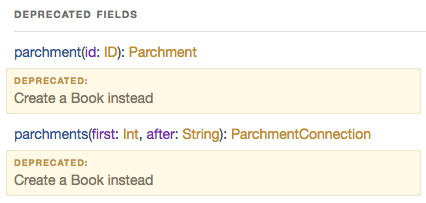Deprecating Resources and Properties (Alternative to Versioning)Table of Contents
Table of Contents
A best practice regarding web API development is to apply the evolution strategy to indicate to client applications which resource types, operations and fields are deprecated and shouldn’t be used anymore.
While versioning an API requires modifying all clients to upgrade, even the ones not impacted by the changes. It’s a tedious task that should be avoided as much as possible.
On the other hand, the evolution strategy (also known as versionless APIs) consists of deprecating the fields, resources types or operations that will be removed at some point.
Most modern API formats including JSON-LD / Hydra, GraphQL and OpenAPI allow you to mark resources types, operations or fields as deprecated.
# Deprecating Resource Classes, Operations and Properties
When using API Platform, it’s easy to mark a whole resource, a specific operation or a specific property as deprecated. All documentation formats mentioned in the introduction will then automatically take the deprecation into account.
To deprecate a resource class, use the deprecationReason attribute:
<?php
// api/src/ApiResource/Parchment.php with Symfony or app/ApiResource/Parchment.php with Laravel
namespace App\ApiResource;
use ApiPlatform\Metadata\ApiResource;
#[ApiResource(deprecationReason: "Create a Book instead")]
class Parchment
{
// ...
}As you can see, to deprecate a resource, we just have to explain what the client should do to upgrade in the dedicated attribute.
The deprecation will automatically be taken into account by clients supporting the previously mentioned format, including Admin, clients created with Create Client and the lower level api-doc-parser library.
Here is how it renders for OpenAPI in the built-in Swagger UI shipped with the framework:

And now in the built-in version of GraphiQL (for GraphQL APIs):

You can also use this new deprecationReason attribute to deprecate specific operations:
<?php
// api/src/ApiResource/Parchment.php with Symfony or app/ApiResource/Parchment.php with Laravel
namespace App\ApiResource;
use ApiPlatform\Metadata\ApiResource;
use ApiPlatform\Metadata\Get;
#[ApiResource]
#[Get(deprecationReason: 'Retrieve a Book instead')]
class Parchment
{
// ...
}It’s also possible to deprecate a single property:
<?php
// api/src/ApiResource/Review.php with Symfony or app/ApiResource/Review.php with Laravel
namespace App\ApiResource;
use ApiPlatform\Metadata\ApiResource;
use ApiPlatform\Metadata\ApiProperty;
#[ApiResource]
class Review
{
// ...
#[ApiProperty(deprecationReason: "Use the rating property instead")]
public $letter;
// ...
}# api/config/api_platform/resources/Review.yaml
# The YAML syntax is only supported for Symfony
properties:
# ...
App\ApiResource\Review:
# ...
letter:
deprecationReason: 'Use the rating property instead'- With JSON-lD / Hydra, an
owl:deprecatedannotation property will be added to the appropriate data structure - With Swagger / OpenAPI, a
deprecatedproperty will be added - With GraphQL, the
isDeprecatedanddeprecationReasonproperties will be added to the schema
#
Setting the Sunset HTTP Header to Indicate When a Resource or an Operation Will Be Removed
The Sunset HTTP response header (RFC 8594) indicates that a URI is likely to become unresponsive at a specified point in the future.
It is especially useful to indicate when a deprecated URL will not be available anymore.
Thanks to the sunset attribute, API Platform makes it easy to set this header for all URLs related to a resource class:
<?php
// api/src/ApiResource/Parchment.php with Symfony or app/ApiResource/Parchment.php with Laravel
namespace App\ApiResource;
use ApiPlatform\Metadata\ApiResource;
#[ApiResource(
deprecationReason: 'Create a Book instead',
sunset: '01/01/2020'
)]
class Parchment
{
// ...
}The value of the sunset attribute can be any string compatible with the \DateTime constructor.
It will be automatically converted to a valid HTTP date.
It’s also possible to set the Sunset header only for a specific operation:
<?php
// api/src/ApiResource/Parchment.php with Symfony or app/ApiResource/Parchment.php with Laravel
namespace App\ApiResource;
use ApiPlatform\Metadata\ApiResource;
use ApiPlatform\Metadata\Get;
#[ApiResource]
#[Get(
deprecationReason: 'Retrieve a Book instead',
sunset: '01/01/2020'
)]
class Parchment
{
// ...
}# Path versioning
ℹ️ Note
REST and GraphQL architectures recommend to use deprecations instead of path versioning.
You can prefix your URI Templates and change the representation using serialization groups:
<?php
// api/src/ApiResource/Parchment.php with Symfony or app/ApiResource/Parchment.php with Laravel
namespace App\ApiResource;
use ApiPlatform\Metadata\Get;
use Symfony\Component\Serializer\Attribute\Groups;
#[Get(uriTemplate: '/v1/books/{id}', normalizationContext: ['groups' => ['v1']])]
#[Get(uriTemplate: '/v2/books/{id}', normalizationContext: ['groups' => ['v2']])]
class Parchment
{
#[Groups(['v1'])]
public $name;
#[Groups(['v2'])]
public $title;
}ℹ️ Note
It’s also possible to use the configuration
route_prefixto prefix all your operations.
You can also help us improve the documentation of this page.
